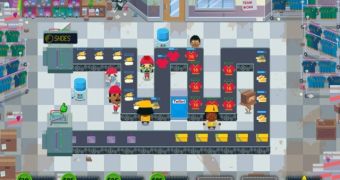Littleloud is a BAFTA-winning creative studio which develops original games for global audiences. The company recently launched a game on the App Store called Sweatshop HD. Apple has rejected it.
According to the UK developer, Sweatshop HD is an iPad game that “challenged people to think about the origin of the clothes we buy.”
While the premise certainly isn’t offending in any way, Apple has a problem with such video game concepts.
Simon Parkin, who works at Littleloud, tells Pocket Gamer that Apple removed Sweatshop from the App Store last month because “it was uncomfortable selling a game based around the theme of running a sweatshop.”
“Apple specifically cited references in the game to clothing factory managers ‘blocking fire escapes,’ ‘increasing work hours for labour,’ and issues around the child labour as reasons why the game was unsuitable for sale,” Parks tells the site.
He also reveals that his company actually updated the app with some amendments, “to clarify that Sweatshop is a work of fiction and was created with the fact-checking input of charity Labor Behind the Label, and to emphasise that the game doesn't force players to play the game in one way or another.”
“Rather, Sweatshop is a sympathetic examination of the pressures that all participants in the sweatshop system endure,” Parks says.
Unfortunately, Apple didn’t barge. “Sadly, these clarifications and changes weren't enough to see the game reinstated for sale,” Parks adds.
It’s probably not too surprising that Apple finds the mere term “sweatshop” somewhat of a buzzword. For years, the company’s biggest partner, Foxconn Electronics, has made headlines that compared its factories to “sweatshops.”
Apple and Foxconn have gone to great lengths to defend themselves from these allegations, some of which were, in fact, untrue.
However, it is worth pointing out that Apple’s developer guidelines clearly state “we view apps different [sic] than books or songs, which we do not curate.”

 14 DAY TRIAL //
14 DAY TRIAL //